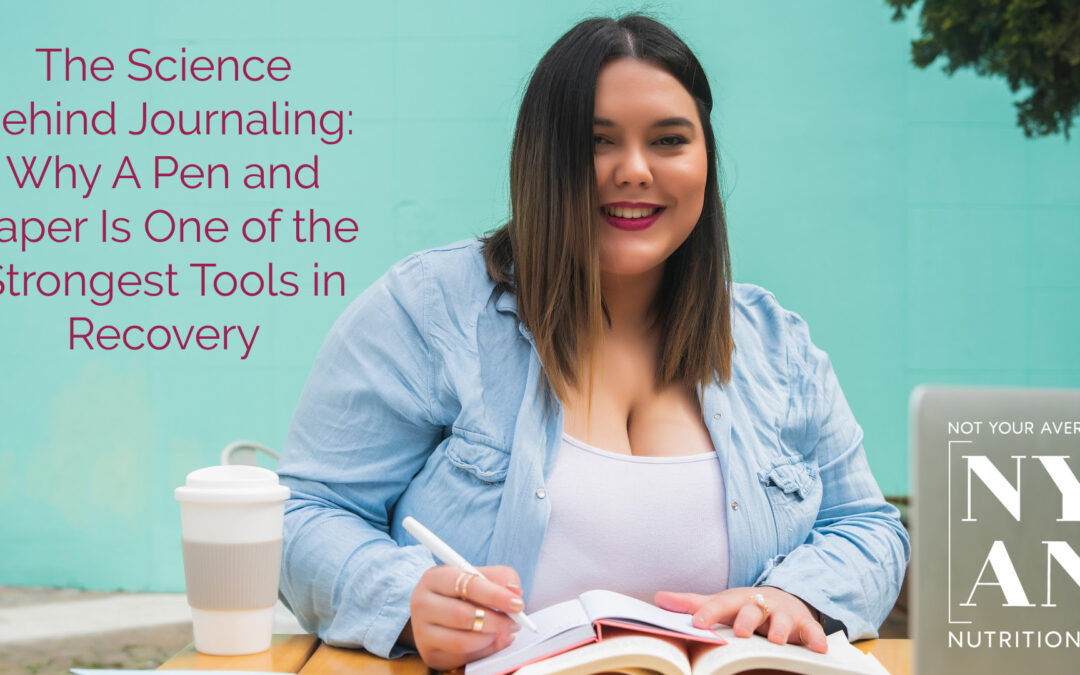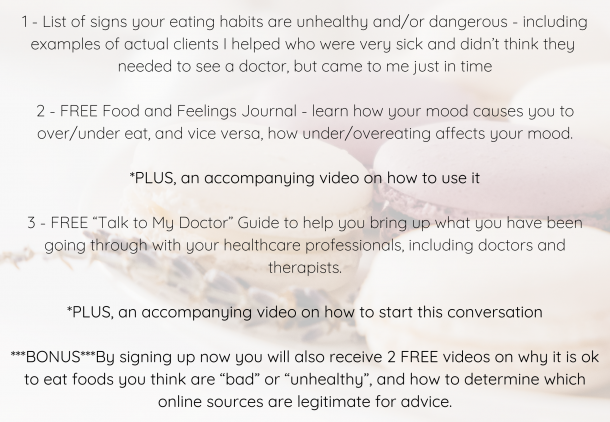By Sydney Navarro
Sydney Navarro is currently completing her Dietetic Internship at Cal Poly SLO (2021-2022), with the end goal of becoming a Registered Dietitian. She grew up in New Jersey, then moved to sunny San Diego where she earned her B.S. in Foods and Nutrition from San Diego State University (2021). Sydney is most passionate about fitness and exercise. She hopes to combine her expertise in nutrition as an RD with her love for all things fitness, to help individuals live in the healthiest version of themselves! In her free time, Sydney loves going on long runs, taking walks while listening to her favorite podcast, trying new restaurants, and watching sunsets with her friends.
Journaling is one of the strongest tools we have in eating disorder recovery. It may seem like a simple activity, but journaling holds so much power. It is a practice that can be used at any point in time, whenever you need it! Your journal is like your dietitian, therapist, recovery coach, or best friend around the clock! The best part is, there are absolutely no rules. Your journal is a safe place that is free of rules, guidelines, or judgment, and it is for your eyes only. Doesn’t it feel so freeing to spill out your feelings to someone and get all those swirling thoughts off your chest? With a journal, you have the option to do that any time you need! Backed by scientific proof, journaling has the ability to rewire your thoughts, ease uncomfortable feelings, and solve problems. Now, let’s first talk about the science behind why and how journaling has such a mighty effect on the brain.
The Proof is in the Pudding!
There is a strong premise behind why journaling has the ability to improve brain activity. The act of writing accesses your left brain: the analytical and rational side. While your left brain is occupied with writing, your right brain is free to be creative, intuitive, and experience feelings. Hence, writing in your journal helps remove those mental blocks and allows you to use your brainpower to better understand yourself, your emotions, your intuitions, and the world around you. Have you ever heard the saying, we are too smart for our own good? The brain always thinks it knows what’s best! Journaling allows you to manipulate your own brain, to see things from an entirely different perspective.
Along with this same idea of using our different sides of the brain, journaling can help solve problems more effectively. Typically, problems are solved with the left-brain, from the analytical and logical perspective. But, sometimes the real answer is found in the right-brained creative and intuitive side. Writing unleashes those capabilities of the right-brain to solve problems, perhaps with unconventional solutions. If you are faced with a problem during recovery that seems too overwhelming to rifle through in your head, grab your journal and write it down. You will be able to see the problem more clearly, free from interjecting thoughts, and start to recognize different solutions that you may have not thought of before. A pen and paper is a powerful life tool. Let’s solve problems one pen-stroke at a time!

Decluttering and Organizing
When negative thoughts start rippling through the brain, especially those ED thoughts, it can sometimes feel like our brain is going to explode! Too many emotions, too many thoughts, too much stuff up there. It’s time to do some cleaning, with your pen and journal as your trusty cleaning tools. Writing negative thoughts down on paper allows you to process them from a more analytical and non-emotional standpoint, then respond to them more appropriately. When these thoughts are left in your brain, they can become crowded by intense emotions, other triggering thoughts, or just the chaos that is swirling around sometimes. Instead of letting these thoughts run rampant in your mind, journaling helps you organize them in an objective manner and determine their true value.
Journaling also helps you isolate certain thoughts, life events, or feelings, and lets you look at them separately from each other. It’s like taking one piece out of a puzzle and seeing how everything else is connected to it. This helps us get away from that very enticing thing we as humans love to do… snowballing. Rolling one thought right into the next and making things seem way bigger than they actually are. When we start to see thoughts as isolated pieces, it is way easier to figure them out, one at a time. Write one down, and move onto the next.
Touching on Gratitude
Oftentimes during recovery, it is easy to forget about gratitude. ED can feel so overwhelming, to the point where it can become hard to identify the good things in life. They start to feel far and few between. Journaling can help cultivate some of that gratitude that gets crowded by ED. It is proven that cultivating gratitude is tied to reducing levels of depression, making progress towards goals, and improving overall mood. Journaling gives you a chance to reflect on all the good things in your life, which can help foster more positivity. A simple practice is writing down 3 things that you are thankful for; either at the beginning or end of your day. This act of thanking yourself for what you have can have a huge impact on your overall mood for the day. Need an idea to start? Be thankful for the time you allowed yourself to journal today!

Getting Started… Page 1.
If the practice of journaling seems difficult to get going at first, that is okay. Those blank pages staring back at you can be overwhelming! It’s important to remember… any start is a good start. Just like starting your recovery journey; by starting somewhere, you have already made leaps and bounds of progress. Here are a couple approaches you could take:
- Start with doodling → Draw the first thing that comes into your mind to get in the habit of freewriting: putting pen to paper and writing down whatever comes to mind, as it flows naturally.
- Write down a story → as if you were telling your friend a funny story, tell your journal!
- Write down what you did today → a simple and easy one. Writing down what you did over the course of the day is a great way to exercise your reflecting skills.
- Write down 5 words that describe how you are feeling in the present moment → journaling doesn’t mean writing novels right off the bat. Starting with a couple words each day is a great way to practice identifying specific emotions and isolating them.
- Write to someone → maybe this is writing to your eating disorder, as if it were a person. This exercise allows you to separate yourself from ED. Remember… you are not your eating disorder. At the top of your page, write “Dear ED,” and see what follows.
Something for You!
To get you started on your journaling journey, we have a free PDF guide with 10 journal prompts to find your motivation in eating disorder recovery. This resource is a great way to get your pen to paper and let the thoughts flow as they will. Sometimes all you need is a spark of inspiration and away you go writing!
CALL TO ACTION: this is your cue to go to Target, TJ Maxx, your favorite stationary store, and buy yourself a cute journal and a fun pack of pens. Be playful with this! Maybe the journal has an inspiring quote on it or you get the mega pack of pens with all different colors. Completely personalize your journaling practice. The journal is your oyster!
As I said before, the only rule about journaling is that there are no rules! Write freely. Forget spelling and punctuation, write without a censor, even write in your own gibberish! This is a safe space for your eyes only. Let your brain unravel on the page. Vent to your journal as if it were your best friend! I promise, you will feel a sense of comfort and relief. Journaling will change the way you process thoughts, feelings, and emotions; help you solve problems from a different perspective; and aid in organizing all the stuff that runs through our minds. Let your journal be the pathway to recovery.
References:
https://psychcentral.com/lib/the-health-benefits-of-journaling#3
https://www.holstee.com/blogs/mindful-matter/5-science-based-benefits-of-journaling
https://www.montenido.com/journaling-essential-part-eating-disorder-treatment/


